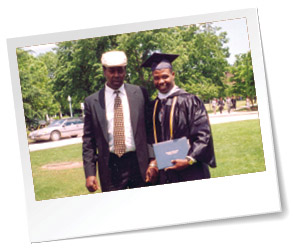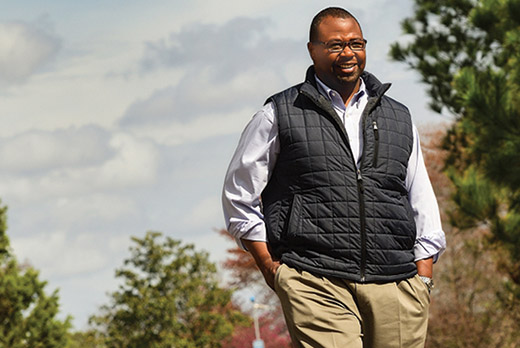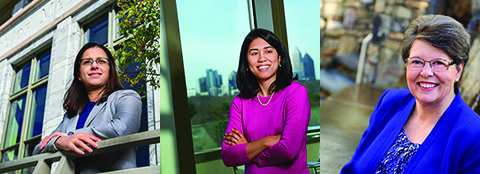"Where are you from?"
Those are words that Bradley Carthon inevitably asks each patient he treats. To Carthon, it's a question that invites connection. In his work, connection matters.
A sense of connection is one reason he came to Winship Cancer Insitute. A Georgia native, Carthon grew up in Fort Valley, a community of about 10,000 south of Macon. His mother taught at a small college; his father worked for the railroad.
Carthon would be the first in his family to pursue medicine—something he felt drawn to by the age of 12. Growing up, he'd already begun to notice disparities in health care, especially for minorities.

Carthon and father at college graduation
Although he was accepted to Harvard as a pre-med undergraduate, Carthon chose the smaller, supportive environment at Hampton University, one of the nation's oldest Historically Black Colleges and Universities. A scholarship from Norfolk Southern Railway, where his dad worked, helped pave the way for him.
When he was 19, his mother was diagnosed with gastric cancer. A surgeon flatly announced that they'd found a large tumor with lymph node involvement and that his mother likely had six months to live. "I realized the process and conversation could have been done better. I felt I could help others in times like that," Carthon says.
Her death left him with "an abundance of questions, in some cases, unanswerable."
Increasingly, his academic and research focus pivoted toward cancer. "I had an interest in helping people who may not have all the resources that are available," he says. "In my own community, I saw people pass away from cancer or have to make choices between paying for the basics of living and cancer treatment."
When Jocelyn Spragg, a Harvard professor who ran a program in medical research for under-represented students, invited him to a summer honors program, he was sold. Carthon was later accepted into the school's MD/PhD program. Between research, residency, and fellowships, he would spend the next 12 years in Boston.
All the while, Georgia beckoned—a call to serve the needs of the people and communities he knew so well. After a fellowship at the University of Texas MD Anderson Cancer Center in Houston, he joined the genitourinary oncology team at Winship, working with patients with prostate, bladder, testicular, and renal cancers.
Within his busy practice, Carthon sees patients ranging in age from 17 to those well into their 90s. He enjoys the challenge of translating complex cancer terminology
into something meaningful.
"I put some thought into how I relay the message," he explains. "In Boston, people just wouldn't get certain analogies. In the South, I can say, 'This thing is aggressive. It's growing rapidly like kudzu, we need to do something,' and that message is understood. We find many creative ways to get the point across, no matter the patient."
Knowing that prostate cancer has a higher-than-average rate of occurrence within the African-American community, Carthon goes where he is needed, speaking about prevention, treatment, and lifestyle issues in local churches and church conventions. He's helped mentor local high school students and attended career days at elementary schools.
To Carthon, those are exactly the kind of connections that matter.
"For me, cancer poses a challenge that simply isn't static—there is always something higher to shoot for."


